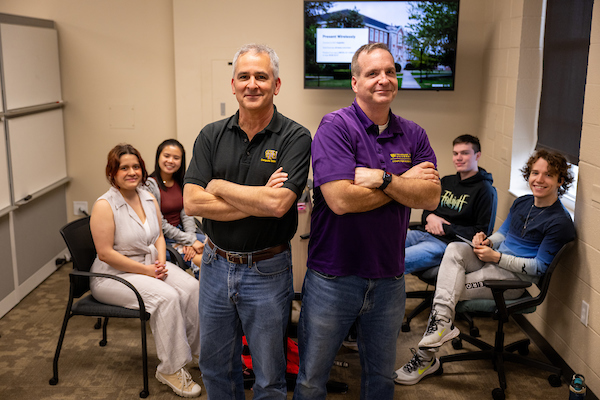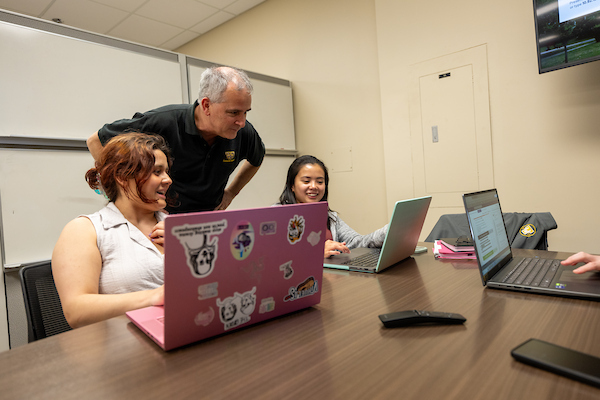How to Stay Organized and Efficient
 Staying organized and efficient in graduate school is crucial to managing the demands
of coursework, research and personal responsibilities. With so many tasks to juggle,
developing a solid system to stay on top of deadlines, readings and projects is key
to maintaining a balanced and productive schedule.
Staying organized and efficient in graduate school is crucial to managing the demands
of coursework, research and personal responsibilities. With so many tasks to juggle,
developing a solid system to stay on top of deadlines, readings and projects is key
to maintaining a balanced and productive schedule.
Bill Eberle, Interim Assistant Dean of Graduate Education for the College of Engineering, Professor of Computer Science, emphasizes the importance of time management and setting clear priorities. He suggests breaking tasks into manageable chunks and using digital tools for organization to stay on track. By finding a routine that works for you, Eberle believes graduate students can not only reduce stress but also improve productivity, leading to greater success in their academic journey.
Organizing Research
Using tools like Mendeley or EndNote helps keep research materials well-organized, which is essential for citation management in thesis and dissertations.
"You will be reading many articles, and when you need to produce a paper, and eventually your dissertation, you will want to have that well organized,” Eberle suggested. “This will make it much easier when you do citations/references."
Effective Time Management
Setting aside specific days for each activity helps manage time efficiently. For example, having a dedicated research day ensures focus and prevents distractions.
"I set aside time for each activity and do my best to stick to it,” he said. “I set aside certain days for teaching activities, certain days for administrative duties and all of Friday is my research day. Dedicate your time, stick to it and shut your door if necessary. Constant interruptions stifle the creative process, breaking up the thought process – especially when you are trying to write."
Detailed Planning
Graduate students often fail to plan properly, which can lead to missed deadlines. It's crucial to make detailed plans and adjust them if internal deadlines are missed.
"From the very beginning, you should plan out your entire time in your graduate program,” Eberle said. “Things may happen (and probably will), but at least you have thought through everything that you need to do (or at least think you need to do). Pay attention to your plan, and if you start missing internal deadlines (set a milestone for each month), reflect on why that is happening. And then make a new plan!"
Structuring your Paper
Graduate students should structure their thesis or dissertation into five main sections, ensuring logical flow and coherence in presenting their research.
"You can generally break a thesis/dissertation into five[BP3] parts: introduction (with your hypothesis and research questions), related work, proposed approach, experiments and results, conclusion and future work."
Preventing Burnout
Dividing tasks into smaller time blocks throughout the day helps maintain a balanced workload. Alternating between reading, writing and experimenting prevents burnout and ensures progress.
"Break up your research tasks into day or half-day time slots,” he said. “Read some, write some and experiment some. Don’t do any of those three all at once. Give yourself a break by doing something else related to the overall research."
Building Momentum
Breaking large projects into smaller milestones helps keep the momentum going and creates a sense of accomplishment.
"Create small milestones in your plan – not big ones. For instance, a milestone should not be 'write journal paper.' Instead, have milestones like 'finish reading papers,' 'draft outline of paper,' 'write paper introduction,' etc. By creating smaller, doable milestones, when you complete one, you will have had success."
Task Management
Eberle uses various tools, like kanban board, a project management tool, and sticky notes, to track tasks and ensure consistent progress, with a focus on achievable daily milestones.
"I use kanban boards, sticky notes, whiteboards, etc. – whatever works,” Eberle said. “And again, they tend to be milestones I can do in a day or two, allowing me to see success multiple times a week."
Effective Communication with Advisors
Regular meetings and open communication channels, such as Microsoft Teams, ensure that students can discuss ideas and seek guidance from their advisors without waiting for scheduled meetings.
"Meet with your advisor at least once a week (30 minutes for master’s students, 60 minutes for Ph.D. students), and come with questions and ideas. Also, use Teams to have an open chat channel with your advisor, and don’t hesitate to ask questions when you are stuck.”
Eberle wishes he had been more organized with notes and ideas from the start, which would have streamlined his academic journey.

Ongoing Professional Development
Continually updating your Curriculum Vitae (CV) and staying current in your field through memberships or subscriptions ensures that you remain competitive and well prepared for career advancement.
"Be a lifelong learner! Stay on top of the latest advancements, perhaps through membership subscriptions (e.g., Institute of Electrical and Electronics Engineers (IEEE), Association for Computing Machinery (ACM)[BP5] ). Keep your CV up to date,”Eberle said. “Every time you publish (or produce a product), put that in your CV – you might forget to add it later."

